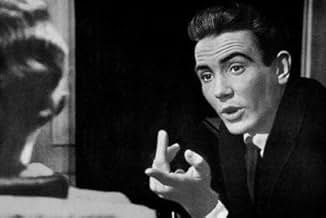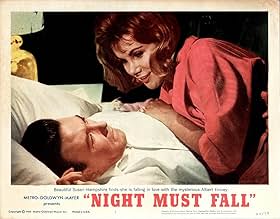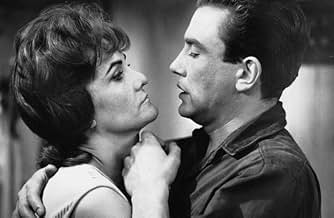IMDb-BEWERTUNG
6,5/10
1080
IHRE BEWERTUNG
Füge eine Handlung in deiner Sprache hinzuA psychotic killer gets in the good graces of his aging invalid employer, and worms his way into the affection of her beautiful daughter, with unpleasant results for all.A psychotic killer gets in the good graces of his aging invalid employer, and worms his way into the affection of her beautiful daughter, with unpleasant results for all.A psychotic killer gets in the good graces of his aging invalid employer, and worms his way into the affection of her beautiful daughter, with unpleasant results for all.
- Regie
- Drehbuch
- Hauptbesetzung
- Auszeichnungen
- 1 Nominierung insgesamt
Joe Beckett
- Detective
- (Nicht genannt)
George Curtis
- Member of Search Party
- (Nicht genannt)
Fred Davis
- Police Officer
- (Nicht genannt)
Richard Neller
- Guest
- (Nicht genannt)
Emile Stemmler
- Waiter
- (Nicht genannt)
Empfohlene Bewertungen
To each his own taste, but I have to disagree with the other review of this movie. I love Albert Finney's performance as a psychopath who has the gift of perceiving the innermost needs of those he meets and then molding his own personality to take advantage of those needs. (I don't know anyone from Wales, nor do I know what a stereotypical "mad Welshman" is.) He and Mona Washbourne play off each other superbly. I do agree with the other review's assessment of the cinematography, and especially love the lighting. To see Finney in TOM JONES (previous) or TWO FOR THE ROAD (following), although he is young, his face does have character and expression lines - he is human. The lighting in this movie smooths his face to make it seem devoid of affect; you feel that his reactions to the people and the world around him spring not from human emotion but from insanity. If you're an Albert Finney fan I definitely recommend viewing this movie and making your own judgment.
Just watched this film on TCM. Quite enjoyable and not as bad as I'd heard from reviews I'd read over the years. My only problem was that I was expecting to understand more about Finney's character by the end of the film (ie: what lead to his psychotic behaviour, what had gone wrong in his childhood...that kind of thing), but never got any deep insight at all. Which for me made him rather a 1 dimensional screen psycho - and therefore the film was not as interesting as it should have been. And the end of the movie was a ..."so what?" affair.
Did I miss something?
Or was I expecting a movie with more depth than it actually had?
Did I miss something?
Or was I expecting a movie with more depth than it actually had?
This project was done in a hurry when a proposal to make a film of Ned Kelly was axed by MGM due to budget worries (at this time Tom Jones had been filmed but not released).
It is not clear why Riesz decided to make a film of this play. Clearly, the part of Danny is tailor made for some show-off acting and Finney grabs the bull by the horns here. His only real mistake is to put on a silly 'boyo Welsh accent. True, the character was Welsh in the play but that's because the part was written by the playwright to play himself. Otherwise, there is no dramatic need for Danny to have a Welsh accent and Robert Montgomery didn't bother in the 1937 version.
The main difference between the film and the play is that the film reveals its hand in the first minute that Danny is a psycho killer. In the play, its not clear until near the end and much of the dialogue are cat n'mouse exchanges between Danny and Olivia.
The result of this is to create a somewhat boring film; you know who the killer is and thus spend an hour and a hour waiting for him to explode. When he does, it has little logic and, to an audience used to the likes of Psycho and its rip-offs like Homicidal, seeing Finney deliver one blow to an off-screen body that you never get to see was always going to be a serious let-down. His retreat into gibberish at the end I thought was uncharacteristic and a cop-out. You never find out who the real Danny is and why he has acted like he has done. I did enjoy the 'hangbags' between Sheila Hancock and Susan Hampshire on the high street of an authentically 60s wet Hertfordshire town.
It is not clear why Riesz decided to make a film of this play. Clearly, the part of Danny is tailor made for some show-off acting and Finney grabs the bull by the horns here. His only real mistake is to put on a silly 'boyo Welsh accent. True, the character was Welsh in the play but that's because the part was written by the playwright to play himself. Otherwise, there is no dramatic need for Danny to have a Welsh accent and Robert Montgomery didn't bother in the 1937 version.
The main difference between the film and the play is that the film reveals its hand in the first minute that Danny is a psycho killer. In the play, its not clear until near the end and much of the dialogue are cat n'mouse exchanges between Danny and Olivia.
The result of this is to create a somewhat boring film; you know who the killer is and thus spend an hour and a hour waiting for him to explode. When he does, it has little logic and, to an audience used to the likes of Psycho and its rip-offs like Homicidal, seeing Finney deliver one blow to an off-screen body that you never get to see was always going to be a serious let-down. His retreat into gibberish at the end I thought was uncharacteristic and a cop-out. You never find out who the real Danny is and why he has acted like he has done. I did enjoy the 'hangbags' between Sheila Hancock and Susan Hampshire on the high street of an authentically 60s wet Hertfordshire town.
The remake of the 1937 film was slaughtered both by critics and audience at the time it premiered and there was mainly one reason for it:the crazed fans of Albert Finney were absolutely shocked,as he daringly chose the role of the psychotic ''killer with the angelic face'', following his all-time favorite roles of ''Saturday night and Sunday morning''and, particularly, ''Tom Jones''.As many historians mention, the ''MGM wives'' who were few of the first to see the film, turned violently against the gifted director, Karel Reisz, shouting ''what have you done to that beautiful boy?''!But this is not a serious reason to dismiss an, overall, very good film, which, however, has some serious flaws.The use of music is exaggerated and some times irritating and, only in the first part of the film, Finney doesn't quite know how to tackle with his disturbed character. But the photography is great, Mona Washbourne gives a superb performance and Karel Reisz does a great job, not only updating the old text and bringing it within the ''realism'' of the British Free Cinema movement, but also with his masterful camera movements and his use of editing and abruptly cutting to different scenes, he creates an imposing psychological thriller, where what you don't see is more disturbing than what you do. Being one of the greatest actors EVER, Finney soon finds a convincing attitude for his character and the last part of the film is absolutely brilliant as a whole.It should be re-examined and re-appreciated, that's why it has to come out on VHS and DVD a.s.a.p.! 7.5/10
A critical failure at the time of its release and considered something of a let-down for its director and star, (it was certainly an odd choice of material), this 1964 film version of Emlyn Williams' play, (it was written in 1935 and filmed two years later with Robert Montgomery), is nowhere near as bad as people say. It's the one about the young psychopath, (a terrific Albert Finney), who worms his way into the affections of elderly invalid Mona Washbourne, (superb), and her initially stand-offish daughter, (an excellent Susan Hampshire). The problem is that in attempting to get to the psychological heart of the piece director Karl Reisz drains it of all suspense and Clive Exton's screenplay, (I haven't seen or read the original play), is a bit on the dull side. But neither is it a disaster and I have never understood why it disappeared so soon after its initial appearance.
Wusstest du schon
- WissenswertesKarel Reisz and Albert Finney had spent a year, including 10 weeks scouting Australian locations, developing a "Ned Kelly" project, but after Columbia finally pulled the plug, they quickly set up "Night Must Fall" at MGM.
- PatzerWhen Olivia is driving home from town, and it's pouring down, there is very heavy 'rain' falling in front of the car as she goes down the hill. In the near background, all of the treetops are still.
- VerbindungenFeatured in MGM Is on the Move! (1964)
Top-Auswahl
Melde dich zum Bewerten an und greife auf die Watchlist für personalisierte Empfehlungen zu.
- How long is Night Must Fall?Powered by Alexa
Details
- Erscheinungsdatum
- Herkunftsland
- Sprachen
- Auch bekannt als
- Al caer la noche
- Drehorte
- Produktionsfirmen
- Weitere beteiligte Unternehmen bei IMDbPro anzeigen
- Laufzeit1 Stunde 32 Minuten
- Farbe
- Seitenverhältnis
- 1.66 : 1
Zu dieser Seite beitragen
Bearbeitung vorschlagen oder fehlenden Inhalt hinzufügen

Oberste Lücke
By what name was Griff aus dem Dunkel (1964) officially released in India in English?
Antwort

























